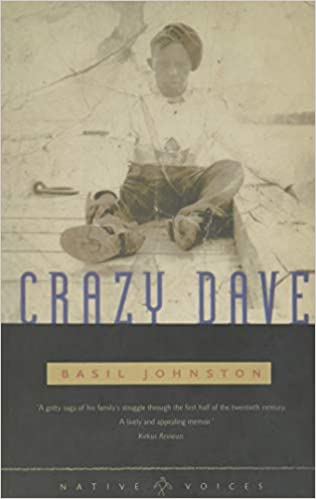Basil Johnston
David, the last of Rosa's five sons, was born with Down syndrome. Unable to care for himself, he and the indomitable Rosa were to be forever bound together, joined by love and necessity in a life already defined by harsh, sometimes tragic circumstances.
And yet, David was remarkable. Strong, stubborn, and utterly determined, he aspired to learn, to be a part of a world in which he would never entirely belong. In that regard, he was and remains a poignant and unsettling reflection of his people, who had fled Wisconsin in the 1830s to seek sanctuary with the Ojibway farther north in what became Canada. With great resourcefulness and integrity, they struggled to sustain and preserve families, a language, and a way of life, while accommodating the increasingly intrusive demands of white society.
Woven of story and recollection—the author's own, his family's, and those of others who were there—Crazy Dave remembers and pays loving tribute to a family, a community, and a culture.
Fischwife on Goodreads wrote:None of us live in isolation. We live with our families and our communities. We also live in our wider country. At each level we need trust and respect, when we don't have that we end up with troubles. When we are different from our neighbours that can either present trouble or opportunities.
Basil Johnston's Uncle David was born around 1920 with Down's Syndrome. According to the book, he might have been the first member living at the Cape Croker reserve with this condition. No one knew for sure what David understood and what his capacity for learning was. His brothers taught him certain life skills including wood chopping. While his family had limited understanding of what he would try to convey to them, others on the reserve didn't.
His mother Rosa spent her life caring for her youngest son. she was always worried with how he would cope, how others on the reserve would treat him, and what would happen to him when she passed away.
Because he was different, David wasn't always treated well. The Priest and the Indian Agent wanted him sent away, yet they didn't attempt to meet and understand David. He was condemned on the basis of assumption and ignorance.
It's unfortunate that peoples and populations around the world are still treated in this same manner. If they are different, then they must be bad/sick/criminal/contagious/etc.
I hadn't intended to read this whole book. I thought I would skim it and move onto another book, but once I started reading and got past the first 50 or so pages I found that I couldn't put it down. I had to read more and learn about David and his family. I laughed when David was trying to lead the mother skunk and her kits to his house and I cried when he was mistaken for a Japanese soldier. I didn't want the story to end, I want to learn more about David and his too short life. Thank-you to Basil Johnston for sharing the story not only of his Uncle but of his family and his reserve.
Johnston depicts the life of a man with Down's syndrome with compassion, humour, authenticity and love. Many of us will recognize Dave and be reminded of our own brother, sister, aunt, or uncle. Johnston also shows how, with support and tolerance, someone like Dave can contribute to a household or community, but he also shows the challenges and worry that can go with being the parent of a person who is different and who can be a target. In doing so, Johnston also shows us the struggles and issues of reservation life under the old Indian Agent system.
I really liked the way Johnston used Dave's manner of speaking to create a character we could see and hear in our minds' eyes and ears. I also liked how Johnston allowed us to empathize with Dave, especially in his idolization of his brother, "Back-a-haw", who always took pains to include him and help him learn.
We can all learn from Crazy Dave and his family.




Leave a Reply